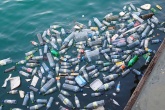Ban plastic waste exports to developing countries, say MPs
A group of MPs has called for a complete ban on the export of the UK’s plastic waste to developing countries.
35 MPs in total have signed an Early Day Motion signalling their concern about the export of plastic waste, noting that ‘two thirds of plastic waste separated for recycling in the UK is currently sent abroad for processing and that 105,000 tonnes of UK plastic was imported by Malaysia alone in 2017-18’.
The motion also underlines the fact that many countries receiving imports of plastic waste have inadequate waste management systems, meaning that waste could end up being landfilled, burned or polluting the natural environment. A 2018 report by waste management charity WasteAid claimed that two thirds of households in lower income countries have no access to waste collection services at all.
Proposed by Liberal Democrat MP Tom Brake, the motion has garnered cross-party support, including signatures from Green MP Caroline Lucas, Labour’s Geraint Davies and Conservative MP Zac Goldsmith. Early Day Motions are motions submitted for debate in the House of Commons that have no specific day allocated for discussion – as a result, very few are actually debated, but they are often used to draw public attention to a particular issue.
In July 2018, a report from the National Audit Office (NAO) highlighted the risk that waste exported for recycling may not actually be recycled; when waste is exported, a Packaging Export Recovery Note (PERN) is issued once the waste is sent abroad, which does not cover what happens to the waste once it arrives at its destination.
This news was widely reported in national media and triggered a public outcry, heightened by headlines such as ‘UK’s plastic waste may be dumped overseas instead of recycled’ (the Guardian) playing into the current negative attitude towards waste and plastic waste in particular.
Exports of UK waste abroad have increased sixfold since 2002, according to the NAO. Before 2018, much of this waste went to China; since January 2018, however, when the Chinese Government banned the import of certain grades of solid waste (including post-consumer plastics), exports to other countries have quickly developed, especially to Southeast Asian markets.
Read more: UK plastic waste exports to Malaysia triple following China ban
The Early Day Motion states that ‘the government should not pass the buck to the Global South on plastic, instead dealing with our own waste on UK soil.’ This is particularly pertinent given that a growing number of countries have now begun to follow China’s lead and implement import restrictions of their own, including Malaysia, Vietnam and Thailand. As a result, export avenues previously relied upon are becoming less stable – and there are growing calls for the UK to invest in and develop its domestic recycling infrastructure.

The signatories to the Early Day Motion are backing calls from campaign group A Plastic Planet for ‘a complete ban on plastic waste exports to the developing world’.
Sian Sutherland, co-founder of A Plastic Planet, said: “Go to any developing country and you will see the irrefutable evidence of the West’s addiction to plastic. For decades we’ve buried our heads about recycling being the answer. Now we know that we have been sending our waste to some of the world’s poorest people. It is immoral and exploitative, and it is happening in our name.
“MPs from all sides are right to today call for an end to the despicable practice of exporting plastic waste abroad. The UK should deal with its own dirt – not ship it abroad to others.”
Can the UK’s recycling infrastructure cope?
While the desire to ban exports to developing countries is understandable, especially in response to the devastating images of plastic waste in the environment that have been widely shared online, the question remains as to whether the UK could deal with the amount of previously exported plastic waste that would have to be retained and processed at home.
Simon Ellin, CEO of trade body the Recycling Association, told Resource the proposal was “very worrying” for this reason, noting that the UK is “something like an 80 per cent net exporter of plastics… If export is banned per se, it will decimate our industry; prices will crash and material will end up in landfill.”
While the government’s recent Resources and Waste Strategy contains a number of proposals designed to stimulate domestic markets for recycled materials – such as a tax on plastic packaging containing less than 30 per cent recycled content by 2023 – Ellin stated that “more measures are needed”.
He continued: “We need to look at energy prices, the taxation system, the planning system and the bigger picture per se. This is not an overnight solution, but if we ban exports, the whole collection infrastructure will collapse and we will be starting from scratch.”
 Waste sent abroad may end up in landfill – like this one in Hunan province, China
More investment for waste management in developing countries
Waste sent abroad may end up in landfill – like this one in Hunan province, China
More investment for waste management in developing countries

Ray Georgeson, Chief Executive of the Resource Association, said: “I agree with all the sentiments expressed in this powerful Early Day Motion, apart from the idea of a blanket ban. Export should remain an option but it has to be high-quality, compliant and legal – trade should be free but it should also be fair.
“I have long advocated the idea of ‘fairwaste’, a Fairtrade approach to managing trade in recycling. Quality, transparency and ethics built into materials trade would benefit developing economies, but if those responsible for exporting can’t deliver this, they should be looking hard at their operations and be challenged hard to deliver responsible trade. The lack of enforcement of existing Waste Shipment Regulations leading to continued localised pollution in developing countries from dumping of contamination built into plastics exported from the UK remains a national scandal.
“Linked to this is the urgent need for investment in waste management infrastructure – collection, processing and safe disposal – in developing countries. They are having to deal with the excesses of Western lifestyles without Western levels of infrastructure and this cannot be acceptable.”
The Early Day Motion can be read on the Parliament website.








